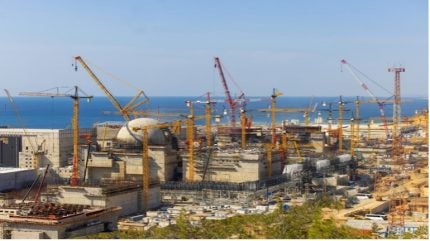
The problems caused by the failure of Germany’s Siemens to deliver key equipment for the Akkuyu NPP under construction in Türkiye have been overcome, Rosatom said. Akkuyu, Türkiye’s first NPP, will eventually host four Russian-designed VVER-1200 reactors. The pouring of first concrete for unit 1 took place in April 2018, for unit 2 in June 2020, for unit 3 in March 2021, and for unit 4 in July 2022. Rosatom is constructing the reactors according to a build-own-operate model. Unit 1 is expected to begin operation in 2025. In July Akkuyu NPP reported that some 70% of the equipment and systems installed at unit 1 had already undergone commissioning.
In September officials had reported that the launch of Akkuyu unit 1 had been delayed by a few months after Siemens Energy withheld s delivery of some critical parts. Siemens refused to supply the equipment for a gas-insulated substation that is needed to transmit power from the plant to the electric grid, despite already having produced it, Rosatom Director General Aleksey Likhachev said.
Türkiye appealed to Germany, but the problem remained unresolved, prompting Rosatom to place an alternative order with China to keep construction on schedule. “When we realised we were having an issue with Siemens, we reached out to our Chinese friends, and they extended a helping hand. Chinese specialists came and installed more than half of the equipment,” Likhachev told Anadolu Agency. “We are now closing the gap that our German suppliers have forced upon us,” he noted. “By working with Turkish specialists and our Chinese partners, I believe we will shorten the installation time of our gas-insulated substation.”
Siemens Energy gave no official reason for withholding the parts, but Turkish Energy & Natural Resources Minister Alparslan Bayraktar said Türkiye understands that it could be related to sanctions on Moscow. He said it was a political decision “on an issue that is not subject to any international sanctions, financing or legal problems”. Officials have said Türkiye may consider fines against Siemens Energy over the cancellation, even though it has worked with the German company for years.
Türkiye now plans to launch trial operation of the first reactor next year, Bayraktar said. It had initially planned to start up in 2023. The remaining three reactors are expected to come online by the end of 2028.
Likhachev highlighted significant progress in the Akkuyu NPP project, emphasising that construction of unit 1 is nearing completion. “With the general construction work at unit 1 now completed, we are fully focused on bringing the unit into operation,” he stated in a written statement.
He explained that the testing and fine-tuning of the turbine, which is essential for generating electricity, has been completed. “If we were to compare a nuclear plant to the human body, the turbine, which represents the muscles, has been tested and is now ready to supply electricity to the grid. Now, we are waiting for steam from the nuclear reactor, which will be the plant’s heart,’” he added.
At unit 2, large pieces of equipment have been installed, and the next phase involves the installation of security systems. “This year, we will also begin assembling the reactor pressure vessel at unit 3, marking a significant step toward completing the plant’s heart.”
The construction of unit 4 will proceed according to schedule to meet the target set in intergovernmental agreements, with the Turkish government setting the goal of completing it by 2028.






